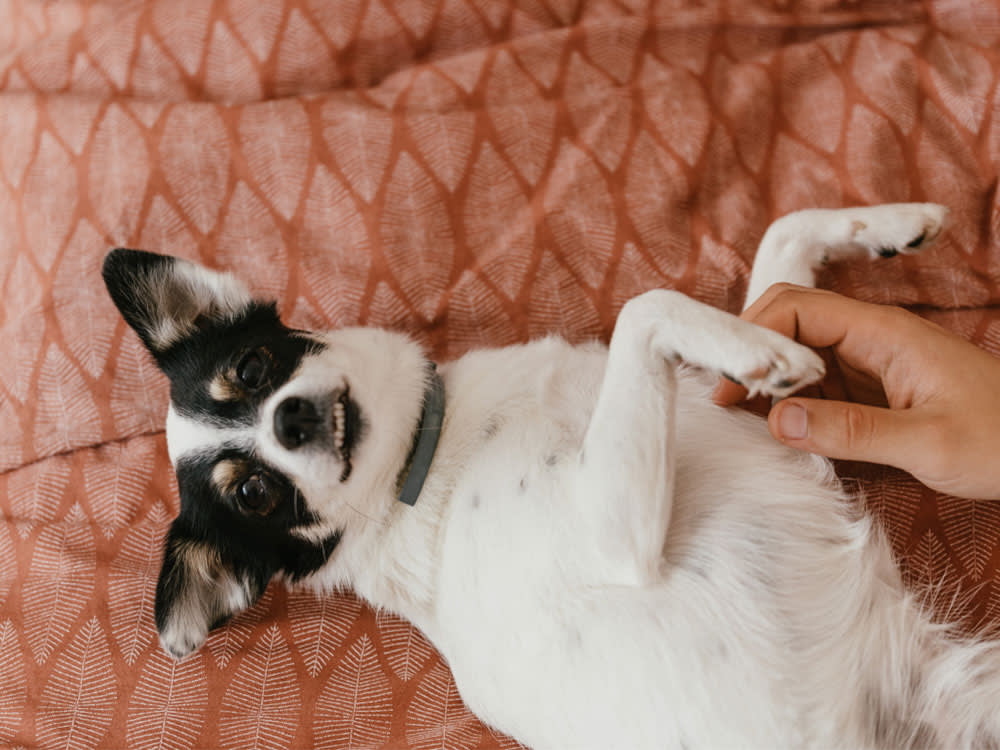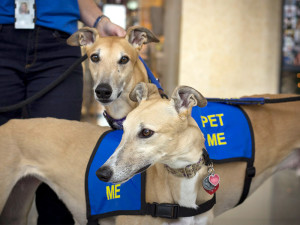
share article

Your pet wants you to read our newsletter. (Then give them a treat.)
Ariel, my Doberman, lies restrained on her back. She is surrounded by strangers, in a room with frightening smells. In an effort to keep cancer at bay, she has been poked, jabbed, and invaded for more than a year and has now developed one of chemotherapy’s dreaded side effects: an inflamed bladder wall, which is hemorrhagic and painful.
The doctor positions the long needle as the ultrasonographer guides its placement via the monitor. Hugging and kissing her, I cannot watch as the needle plunges into her bladder to retrieve its specimen. Yet I know the moment it happens — Ariel’s eyes dilate like deployed airbags, and she turns and tenderly cleans my face until the hurt is withdrawn. This contact is considered by many researchers to be part of the mechanism of the placebo effect at work in dogs.
Placebo Effect on Animals
Placebo is “the beneficial effect that arises from a patient’s expectations from a treatment, rather than from the treatment itself.” Does the placebo effect exist in dogs? Until recently, the presumed answer was a resounding no, because animals were thought to lack the cognitive capacity to understand the intent of medical care or the power of suggestion, or to have hope of recovery.
What a howl! Such nonsense is summarily dispelled by two pages of technical references underpinning a recent veterinary journal article entitled “The placebo effect in animals,” which documents in detail the existence of the placebo effect in dogs, among other species. A subsequent article, “Effects of human contact on animal health and well-being,” follows up with even more scientific references regarding the substantial benefits of this adjunct therapy.
Both of the articles suggest that the placebo effect in veterinary medicine can enhance the efficacy of medical treatment, and findings make a “strong scientific argument for encouraging in-hospital visitation by owners when animals are hospitalized.”
Experimental studies on the mechanisms of the placebo effect in animals have been underway for at least 70 years. Components of this phenomenon, including belief, expectation, and trust, are presumed to be present at a neurobiological level, though cellular mechanisms remain unknown.
In humans, the placebo effect is generally ascribed to one or more of the following: classical conditioning, expectation, and endogenous opiates (the body’s own naturally produced pain relief). In animals, interestingly, a fourth mechanism is also theorized: the effect of human contact. Numerous studies have documented positive physiologic and health effectsopens in a new tab as a result of animals’ visual and tactile contact with a human. The ability of human contact to optimize an animal’s comfort and well-being provides a strong rationale for pet owners being present for many medical procedures.
A recent double-blind veterinary study involved arthritic dogs randomly assigned to either a treatment or a placebo group. Their response to treatment was objectively assessed by force-plate analysis, which precisely measures the use of individual limbs while a dog is in motion. The result? Fifty-six percent of placebo-treated dogs had an objectively measured, significant, positive response.
Positive Effects on the Body
When a person strokes a dog, substantial decreases in the dog’s heart rate can be noted. Human contactopens in a new tab also consistently elicits major positive changes in canine blood pressure and aortic and coronary blood flow. The placebo effect in animals on immunomodulation, cardiovascular disease, drug withdrawal, tumor growth and much more is well documented. The proverbial bottom line is that an animal’s mental and emotional state has a profound influence upon its physical health. And, human contact has a positive impact on the well-being of animals of all age groups, and produces an array of physiologic, emotional, and health effects.
Upon discharging Wendy, my beloved, gentle, 11-year-old Doberman to my care, clinicians at the veterinary school advised me to “take her home and love her, she has two to three weeks to live.” I knew this to be correct. Only a few cases have ever survived Wendy’s untreatable and rare cancer for several months, and those who did required intensive, constant medication. After a month of blood transfusions, a last-ditch effort that in recorded practice has never worked, Wendy became incompatible with all available blood from canine blood banks.
On a hunch, I had her red-and-rust son’s blood tested and found that it was compatible. I communed with her, telling her that this would be the last transfusion; I also promised to discontinue other treatments and stay close by, enveloping her in love. One year later, with no further intervention, Wendy still warms my side. The veterinary school clinicians are in disbelief. There is truly no medical explanation.
That’s all right. I’ll take Ariel, Wendy, and the placebo effect any day.
REFERENCES
McMillan, Franklin D. “The placebo effect in animals.” J Am Vet Med Assoc 1999; 215, No. 7:992–999.
McMillan, Franklin D. “Effects of human contact on animal health and well-being.” J Am Vet Med Assoc 1999; 215, No. 11:1592–1598.
Kathy Davieds, DVM
Kathy Davieds, DVM has been a small-animal veterinarian for 25 years. Active in therapy-dog work, rescue and other canine endeavors, she is also founder of the Virginia Partnership for Animal Welfare and Support. She is currently owned by several uncropped Dobes.
Related articles
![Valentin Pujadas illustration]() opens in a new tab
opens in a new tabFYI, Pets Are Incredibly Good For Your Mental Health
This Mental Health Awareness Month, experts share the science-backed ways our pets offer us emotional support.
![Two Greyhounds with vests that are airport therapy dogs for CLT]() opens in a new tab
opens in a new tabStress Busting Benefits of Airport Therapy Dogs
These working dogs calm harried travelers.
![Dog looking out a window in the winter]() opens in a new tab
opens in a new tabWinter Is Here—Can Your Dog Suffer Seasonal Depression?
Here’s why your pup may get the winter blues, too.
![Grey cat at looking up from eating on floor at home]() opens in a new tab
opens in a new tabGut Feelings: How to Balance Your Pet’s Microbiome
The mind-gut connection isn’t just for people. Your dog or cat’s gut microbiome plays a big role in their health and well-being.





